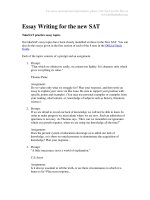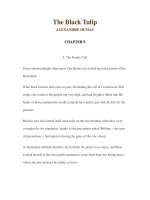Week 9 - The Complex Sentence potx
Bạn đang xem bản rút gọn của tài liệu. Xem và tải ngay bản đầy đủ của tài liệu tại đây (341.86 KB, 64 trang )
E_English Grammar Course
E_English Grammar Course
Chapter VI
The Complex Sentence
1. Subordination
2. Classifications of subordinate clauses
3. Subordinators
4. Nominal clauses
5. Adverbial clauses
6. Comparative and Comment clauses
Issues
Issues
Subordination
Subordination
1
1/1
Subordination
Subordination
-
Non-symmetrical relation held
between two clauses: one clause is
a constituent/ part of the other
Subordination
Subordination
1
1/2
Subordination
Subordination
i.e. one clause is
-
Non-symmetrical relation,
a constituent/ part of the other
1 2 21
[I like John [because John likes me] ]
1 1
[superordinate/ independent/ main clause ]
2 2
[subordinate/ dependent clause]
-
Non-symmetrical relation held
between two clauses: one clause is
a constituent/ part of the other
Subordination
Subordination
1
1/3
Subordination
Subordination
Hierarchy of clauses
X- Y- Z-
( I think [ that you can do it { if you try} ] )
S V O A
Z = subordinate to Y
Y = subordinate to X
Y & Z = dependent clauses
X = independent clause
Let's check
Let's check
Do Exercise 11.1 (handout Week 9)
Classifications of subordinate clauses
Classifications of subordinate clauses
2
2/1
Classifications of subordinate clauses
By structural type By functional type
Classifications of subordinate clauses
Classifications of subordinate clauses
2
2/2
By structural type Finite clause
Nonfinite clause
Verbless clause
See more in 11.2 - 11.5
Classifications of subordinate clauses
Classifications of subordinate clauses
2
2/3
By structural type Finite clause
Nonfinite clause
Verbless clause
-
contains a subject and a predicate
-
verb phrase having tense, person & number concord, & mood
Classifications of subordinate clauses
Classifications of subordinate clauses
2
2/4
By structural type Finite clause
Nonfinite clause
Infinitive with to
Infinitive without to -ed participle
-ing participle
Classifications of subordinate clauses
Classifications of subordinate clauses
2
2/5
By structural type Finite clause
Nonfinite clause
Infinitive with to
Infinitive without to -ed participle
-ing participle
Without S: The best thing would be to tell everybody.
With S: The best thing would be for you to tell everybody.
Classifications of subordinate clauses
Classifications of subordinate clauses
2
2/6
By structural type Finite clause
Nonfinite clause
Infinitive with to
Infinitive without to -ed participle
-ing participle
Without S: Leaving the room, he tripped over the mat.
With S: Her aunt having left the room, I declared my
passionate love for Celia
Classifications of subordinate clauses
Classifications of subordinate clauses
2
2/7
By structural type Finite clause
Nonfinite clause
Infinitive with to
Infinitive without to -ed participle
-ing participle
Without S: All I did was hit him on the head.
With S: Rather than John do it, I’d prefer
to give the job to Mary.
Classifications of subordinate clauses
Classifications of subordinate clauses
2
2/8
By structural type Finite clause
Nonfinite clause
Infinitive with to
Infinitive without to -ed participle
-ing participle
Without S: Covered in snow, he looked like a snowman.
With S: We left the room and went home, the job finished.
Classifications of subordinate clauses
Classifications of subordinate clauses
2
2/9
By structural type Finite clause
Nonfinite clause
Verbless clause
1. Ellipsis of the verb ‘be’
- Dozens of people died in the accident, many of them children.
- Whether right or wrong, he always dominates the arguments.
Classifications of subordinate clauses
Classifications of subordinate clauses
2
2/10
By structural type Finite clause
Nonfinite clause
Verbless clause
2. Reduction of non-finite clauses
-
Too nervous to reply, he stared at the book in front of him
and dared not look up.
Classifications of subordinate clauses
Classifications of subordinate clauses
2
2/11
By function Nominal clause
Adverbial clause
Comparative clause
Comment clause
Subordinators
Subordinators
3
3/1
Subordinating
conjunctions
Simple subordinators
Compound subordinators
Correlative subordinators
See more in 11.6 - 11.9
Subordinators
Subordinators
3
3/2
Subordinating
conjunctions
Simple subordinators
Compound subordinators
Correlative subordinators
after, though, although, as,
because, before, if, once
since, that, until, when
where, while, etc.
Subordinators
Subordinators
3
3/3
Subordinating
conjunctions
Simple subordinators
Compound subordinators
Correlative subordinators
-
ending with ‘that’: in that, so that, such that …
-
ending with optional ‘that’: now (that), provided (that),
supposing (that), seeing (that)…
-
ending with ‘as’: so far as, as long as, so as (to do sth)…
-
ending with ‘than’: sooner than, rather than…
-
others: as if, as though, in case
Subordinators
Subordinators
3
3/4
Subordinating
conjunctions
Simple subordinators
Compound subordinators
Correlative subordinators
if… then, although… yet, as… as, so… as, so… that
no sooner… than, more/ less… than, the… the, whether… or
Subordinators
Subordinators
3
3/5
Other indicators of
subordination
Wh-element initial markers
Subject-operator inversion
No marker
Subordinators
Subordinators
3
3/6
Other indicators of
subordination
Wh-element initial markers
Subject-operator inversion
No marker
I don’t know who knocked at the door last night.
Subordinators
Subordinators
3
3/7
Other indicators of
subordination
Wh-element initial markers
Subject-operator inversion
No marker
Had it not been for your help, I would have died.
Subordinators
Subordinators
3
3/8
Other indicators of
subordination
Wh-element initial markers
Subject-operator inversion
No marker
1. nominal clause
e.g. I suppose (that) you’re right.
2. comment clause
e.g. You’re right, I suppose.









